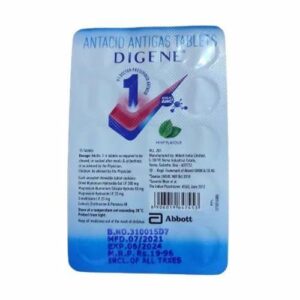SIMETHICONE + DRIED AL(OH)3 + MG AL SILICATE + MG (OH)2
Simethicone: Simethicone is a medication used to relieve symptoms associated with excess gas in the gastrointestinal (GI) tract, such as bloating, belching, and flatulence. It is available over-the-counter and by prescription.
The mechanism of action of simethicone is to break up gas bubbles in the stomach and intestines. It works by reducing the surface tension of gas bubbles, allowing them to combine into larger bubbles that can be easily passed out of the body.
The recommended dose of simethicone varies depending on the form it is available in. For chewable tablets, the usual dose for adults and children over 12 years old is 40 to 125 mg, taken after meals and at bedtime. For liquid forms, the usual dose for adults and children over 12 years old is 40 to 360 mg per day, divided into 4 doses.
Simethicone is generally well-tolerated with minimal side effects. The most commonly reported side effects include mild constipation or diarrhea. However, these effects are rare and are usually temporary.
It is important to note that simethicone is not effective in treating other GI conditions, such as acid reflux, heartburn, or stomach ulcers. It is specifically used for symptomatic relief of gas-related symptoms. If symptoms persist or worsen, it is recommended to consult a healthcare professional for further evaluation and treatment.
Dried Al(oh)3: Dried Al(oh)3 (dried aluminum hydroxide) is a medication used to treat symptoms related to excess stomach acid, such as heartburn, indigestion, and acid reflux. It belongs to a class of drugs known as antacids.
The mechanism of action of dried Al(oh)3 involves neutralizing excess stomach acid. It acts as a proton pump inhibitor, reducing the production of gastric acid by binding to the hydrogen ions in the stomach, thereby raising the pH level. This neutralization helps relieve symptoms associated with hyperacidity.
The recommended dose of dried Al(oh)3 can vary depending on the individual’s condition and the severity of symptoms. It is usually taken orally in the form of tablets, suspensions, or powders. It is important to follow the instructions provided by the healthcare provider or read the product label for accurate dosing information.
Like all medications, dried Al(oh)3 can have side effects. Common side effects may include constipation or diarrhea, nausea, vomiting, abdominal discomfort, and flatulence. These side effects are usually mild and temporary. However, it is advised to consult a healthcare professional if any severe or persistent side effects occur.
It is essential to note that dried Al(oh)3 may interact with other medications. It is recommended to inform a healthcare provider about all the medications being taken to avoid potential drug interactions.
Overall, dried Al(oh)3 is a widely used antacid that neutralizes stomach acid to relieve symptoms of excess acidity. However, it is important to use this medication as directed and consult a healthcare provider if any concerns arise.
Mg Al Silicate: Mg Al Silicate, also known as magnesium aluminum silicate or simply as MAS, is a naturally occurring clay mineral commonly used as an active ingredient in various pharmaceutical and cosmetic products.
Use: Mg Al Silicate is primarily used as an internal and external adsorbent and suspending agent. It is commonly used in antacids to relieve symptoms of heartburn, acid indigestion, and upset stomach. It is also used in topical creams, lotions, and gels to provide a smooth texture and enhance the dispersion of other active ingredients.
Mechanism of Action: Mg Al Silicate works by absorbing excess stomach acid in the gastrointestinal tract, thereby neutralizing it and providing relief from heartburn and acid indigestion. When used topically, it functions as a suspending agent, helping to distribute and stabilize other active ingredients within the formulation.
Dose: The dose of Mg Al Silicate can vary depending on the specific product and condition being treated. For antacids, the recommended dosage is typically 500-1000 mg taken orally as needed, following the instructions provided by the manufacturer. For topical products, follow the usage instructions provided on the packaging or as directed by a healthcare professional.
Side Effects: Mg Al Silicate is generally considered safe when used as directed. However, some potential side effects may include constipation or diarrhea, depending on the individual’s response to the drug. Additionally, long-term use of antacids containing Mg Al Silicate may result in electrolyte imbalances. It is important to consult a healthcare professional if there are any concerns or if side effects persist or worsen.
Mg (oh)2: Mg (OH)2, also known as magnesium hydroxide, is a medication used to relieve symptoms of indigestion, heartburn, and upset stomach. It is commonly sold as an over-the-counter antacid and can also be prescribed by a medical professional.
The mechanism of action of magnesium hydroxide is as an acid neutralizer. When ingested, it reacts with the excess stomach acid to form magnesium chloride and water. This helps decrease the acidity in the stomach, providing relief from symptoms such as heartburn and acid reflux.
The recommended dose of magnesium hydroxide varies based on the individual’s age and the severity of symptoms. Typically, adults can take 800-1600 mg of magnesium hydroxide per day, divided into several doses. It is important to follow the instructions provided by the healthcare professional or those listed on the product packaging.
While magnesium hydroxide is generally considered safe, it can cause some side effects. Common side effects include diarrhea, abdominal cramps, and a laxative effect. These side effects are more likely to occur with higher doses or prolonged use. It is recommended to consult a healthcare professional if the side effects persist or worsen.
Additionally, individuals with kidney problems or those on a low-magnesium diet should exercise caution when using magnesium hydroxide. It is essential to inform the healthcare professional about any pre-existing medical conditions and medications being taken to avoid potential interactions.
Overall, magnesium hydroxide is an effective medication for short-term relief of indigestion, heartburn, and upset stomach. However, it is important to use it as directed and consult a healthcare professional if symptoms persist or worsen.

